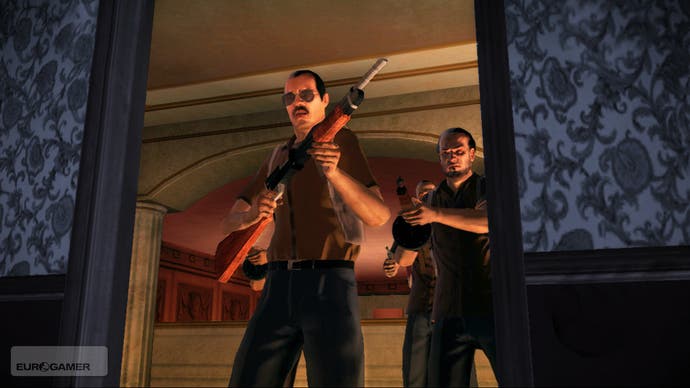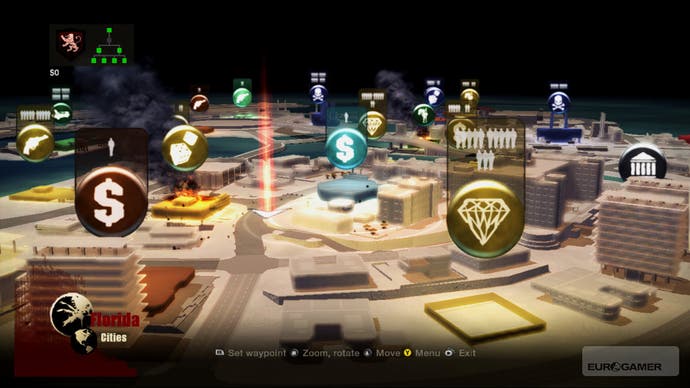The Godfather II
Don go breaking my heart.
And so it goes on. With five families to take out across three locations (New York, Florida and Cuba) the formula is rinsed, repeated and recycled, with occasional story elements woven into the game every now and then. Similar to last time around, the narrative is something of a sideshow to the main event of 'owning' the map, and as such doesn't provide the focal point like most narrative-driven action games. During the early portion of the game, it's a little disorientating to find yourself lacking any specific 'missions' to perform. With no green cross to chase on the mini-map, you can find yourself getting caught up in a cycle of doing needless favours for people simply because it makes you feel like you're doing something. But once you accept and understand that real progress comes from taking over businesses, finding out the location of rival soldiers and then wiping them out, there's mild satisfaction to be gleaned out of this somewhat clunky procedure.
That said, there's a lingering feeling that the game's 3D map system and accompanying menus amount to little more than a shortcut to getting your hands dirty. While the original Godfather forced players into OCD-heavy repetition, at least it was you actually pulling the trigger and getting to see the whites of your enemy's eyes. In the sequel, if you use the map a lot you can end up being essentially the commander of operations with only a peripheral involvement in a large portion of the action.
Worse still, it's not even as if you can play it like a strategy game, because you never get to see how the battle plays out, and only get updates on the progress when your men get taken out. So as much as giving players the chance to send their family members off to do battle is welcome in some respects, it reduces the action to little more than a protracted dice roll. The in-game advisor even tells you what your chances of winning are - not once was there any feeling of tension. I won practically every single time, and even when I lost I could send more soldiers in to recapture whatever I was after before the enemy had a chance to repopulate it.

To diminish the tension even further, the decision to give everyone recharging health means there's rarely any requirement to play the game skillfully. You just charge in all-guns-blazing, snap between targets with the hugely generous auto-aim facility and blitz one obliging enemy after another. At the core there remains an enjoyably precise combat system, but EA has predictably pandered to the mysterious demands of the audience of players who want games to be played for them and want zero challenge, and for death to be the exception rather than the rule.
Frankly, the sight of you and your AI buddies charging around getting raked with gunfire and sprinting away unharmed is a pathetic sight, and smacks of game designers not even bothering to try anymore. You're almost invincible for the large majority of the game, and there's practically no need to make any effort. The game aims for you, and then rapidly recharges your health when you screw up - and with three AI players now fighting on your side, you can often just let them get on with most of the hard work anyway - or just start the battle from the world map and avoid getting your hands dirty altogether. It's one thing giving the player a less frustrating experience, but another entirely to make it feel as if victory is a foregone conclusion.

To compound matters rather tragically, the game features some technical howlers that make no sense. Towards the latter third of the game the traffic completely disappeared for me, leaving an eerily empty world, also devoid of pedestrians. As well as making the game feel horribly empty, it meant that I had no choice but to travel across the city on foot, running for miles before coming across a rare parked car. And what of the game's PlayStation Home-esque art and animation style? There can't be too many people willing to stick up for that clinical, soulless style with its lurid colour balance. Seen in the context of a full game, it's even less appealing. Far from evoking a Mafioso style, its horribly dated-looking mannequins do the subject matter zero justice.
Having had such a great run of form with new IP, this is a stark return to the EA of old, where a treasured licence is butchered irredeemably. Lacking both a challenge and soul, and failing to even engage on a narrative level, what you're left with is an overly forgiving shooter with weak strategy elements, which only serve to make it even easier for you. Having played right to the end, I wish there was something I could point to in its defence, but all I'm left with is the empty realisation that they've managed to somehow make this even less entertaining than the flawed original.









